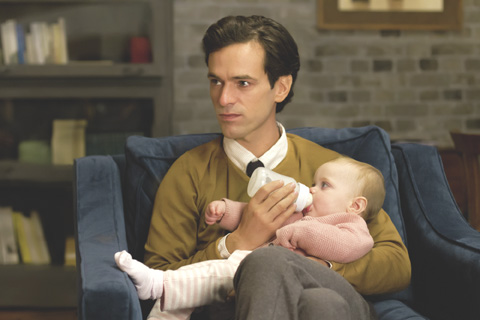![]() In the English-speaking world, Ruth Rendell hasn’t exactly made her mark on the big screen. In the Francophone world, however, the late mystery and thriller author’s effect continues to be felt. At fewer than 15 pages, Rendell’s Edgar Award–winning short story “The New Girlfriend” seems an odd choice for a feature film. But director François Ozon has fleshed out this spare selection, adding tons of characterization and plot (indeed, the film is really only loosely inspired by the source material) but always preserving the underlying dark tone.
In the English-speaking world, Ruth Rendell hasn’t exactly made her mark on the big screen. In the Francophone world, however, the late mystery and thriller author’s effect continues to be felt. At fewer than 15 pages, Rendell’s Edgar Award–winning short story “The New Girlfriend” seems an odd choice for a feature film. But director François Ozon has fleshed out this spare selection, adding tons of characterization and plot (indeed, the film is really only loosely inspired by the source material) but always preserving the underlying dark tone.
The film opens with the funeral of Laura (Isild Le Besco), who’s passed away after a long illness. Best friend Claire (Anaïs Demoustier) speaks about her relationship with Laura, interspersed with flashbacks of the two transforming from schoolmates into young women. Laura leaves behind a husband, David (Romain Duris), and an infant daughter, Lucie, and Claire vows that she’ll uphold the promise she made to her dying best friend: to watch over David and Lucie for the rest of her life.
Soon after, Claire falls into a depression, but when her husband, Gilles (Raphaël Personnaz), urges her to visit David and Lucie, matters take an abrupt turn for the strange. Cue the record needle scratch sound effect as Claire walks into the living room to see Lucie in the arms of a woman: David in drag. David explains that cross-dressing has always brought him pleasure and it’s something that his late wife knew about and accepted. When Laura was alive, however, her femininity was enough; with the loss, David feels the need arise within him again. He also tells Claire that he thinks that Lucie needs both a mother and a father.
While Claire is initially repulsed, she becomes intrigued, and an unlikely friendship springs up as she begins to help David explore his female persona, whom they dub Virginia, while keeping this aspect of her life a secret from her husband. Ozon plays with gender and sexuality quite effectively—there’s a quietly witty moment in which Gilles, a man’s man who questions David’s virility, dons Claire’s scarf because he’s cold. However, in today’s climate, the shock value of a gender-bending performance wears off quickly: we’ve come a long way from The Crying Game. But there’s plenty to unpack and explore even after viewers learn David’s secret.
The film subtly but powerfully establishes a dark, often unsettling mood; there are even a couple of scenes that evoke The Black Swan. Plot wise, it’s a fairly sedate work, without a ton of twists and turns: consider this the anti–Gone Girl in that regard (though the ending certainly takes what can only be called a very French twist). What dominates here are the troubled thoughts and emotions of Claire. The innovative and inspired Ozon takes full advantage of the medium. His visual storytelling employs images to establish plot and characters, rather than using clumsy expository dialogue, and often plays with viewers’ expectations. (The scenes that roll over the opening credits are a particularly inspired addition.)
It’s Ozon’s visual choices that make the film’s points, such as drawing parallels between Laura and Virginia. In flashbacks, Claire looks tomboyish compared with the graceful and ethereal Laura. Similarly, in the present day, Claire wears button downs and trousers that Annie Hall would envy, while Virginia revels in her newfound femininity, sporting light and airy frocks and va-va-voom figure-hugging dresses.
Viewers may remember Duris as the endearingly boyish Xavier from L’Auberge Espagnole. Here, he spends more time playing Virginia than David, but he pulls off the dual role, of sorts, impressively, with a sultry and often realistically faltering performance. He channels a young woman grappling uncertainly but eagerly with her budding sexuality. Demoustier, on the other hand, is understated, though it’s always clear that there’s something brooding below the surface, and Ozon will have audiences rapt as they try to figure out just what is going through her mind.
As with the best of Rendell’s novels and stories, the film is the thinking man’s (or woman’s) thriller: intelligent, thought-provoking, disturbing, and utterly engrossing. To this winning combination, Ozon adds a dose of sensuality (let’s not forget that this is a French adaptation). Rendell would be pleased.

















Leave A Comment